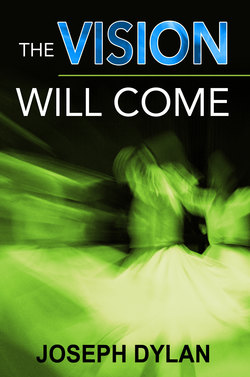The Vision Will Come

Реклама. ООО «ЛитРес», ИНН: 7719571260.
Оглавление
Joseph Dylan. The Vision Will Come
Chapter One
Chapter Two
Chapter Three
Chapter Four
Chapter Five
Chapter Six
Chapter Seven
Chapter Eight
Chapter Nine
Отрывок из книги
It has always been my contention that there was nothing better in this world than a good marriage, and nothing worse than a bad one. It is a celestial cathedral for the washed and the unwashed, the inspired and the uninspired. It is a refuge to the hopeless. Somehow, though, that was not enough to suffice my parents. As far as my family went, the gods above must have smiled in mirth as they witnessed the dehiscence of my parent’s marriage, for it crumbled in its very essence. In the beginning it was just too perfect, and perfection was the bailiwick of the provident. Whether it was due to the gods or not, but after a year of two, it slowly disintegrated. My father was a tall man with rugged good looks, facile charm, and a fast way with the ladies; while my mother was a true lady. with a winsome face, a pert body, a mind that had little time for fools. For the first few years, their marriage was as warm and inviting as the fireplace when the house was enveloped by a winter storm. There might be snow on the ground, but inside there was a fire exhausting itself in the fireplace. Like some living thing, this blaze inhaled and exhaled, grew and gave way. Perhaps, just perhaps, it was the very combustion in its raging heat, consumed itself. Looking back on it, it was almost entirely my father’s fault, for it was his inherent imperfections that drove them apart. I blame him no less now, then a I did when I was in my parochial junior high school. In the early years of their marriage, they looked like a content, complacent couple out of a Norman Rockwell painting. The blaze, though, was dying in its own conflagration. That is just my supposition. But I truly doubt that it didn’t cross some other people’s minds.
My father’s father was the shop keeper at a small haberdashery in Denver and he wanted better for his son. Pulling connections, he got him a job as a teller in at First United Bank. Conscientious and polite and competent to all his clients, my father came into the favor of the immediate manager at the bank. In no undue time my father was promoted to a loan manager. His talent at this position continued much as it had at his previous position. He managed to thrive in his position for three or four years. Finally, at the behest of his employers at the bank, my father moved from Denver to Riverton to be groomed as a bank manager in the small town at the western lip of the Rocky Mountains, where they had just established a bank. That’s where he met my mother, who fitted proper women into their proper finery in Mr. Bond’s Dress Shop at the Fourth Avenue and Main Street, an avenue in which it seemed Mr. Julius Bond had a finger in every pie. Her people were forbearers in the valley and had been farming corn and other crops near Fruita since the Grand Valley opened to venturers. But the valley was arid, the valley was barren and white, with alkaline patches of caliche, looking like the burns of dog urine dotting a green lawn, did all but defeat these sodbusters. The land was good for little else, though, so the farmers ran cattle and sheep and chickens on the side. In time, the hamlet became a village, and the village became a small town. By the nineteen fifties, the valley walled in twenty or thirty thousand souls. Labouring in every profession or calling, they formed the largest collections of beings between Denver and Salt Lake City.
.....
One morning, after several nights on a binge, he showed up on the stoop of our house complaining of belly pain. At the hospital, Dr. Reed tried to delicately explain to us that he had peritonitis. When my mother asked how this had occurred, he seemed as flummoxed as a high school chemistry professor trying to explain to his high school class just what quantum mechanics exactly was. We could hardly blame him. Father was in bad shape that admission. When finally we were able to see him, he was unwashed and unshaved and his lovely Celtic hair splayed out in all directions. Picking things out of the air, he didn’t seem to know who Brent or I were, and appeared more intent on gathering things that were not there. Neither did he know what day it was, nor did he know the month. Coming and going, like acolytes in a church, the nurses hung bottles of antibiotics and vitamins, while withdrawing with partially filled plastic urinals. They, in turn with my mother, applied cool, wet wash clothes to father’s forehead. Brent and I stood there mutely, feeling ridiculous, as though we had been caught in some passion play.
I remember Dr. Reed guiding my mother outside the door, out of what he thought was our earshot, and saying, “I don’t think he’s going to make it this time, Rebecca. Hope for the best, but be prepared for the worst.” Then he moved onto the rest of his patients. He had a full house of them, not a few of them suffering from the same ills as my father, sicknesses induced from the contents of a bottle of liquor.
.....